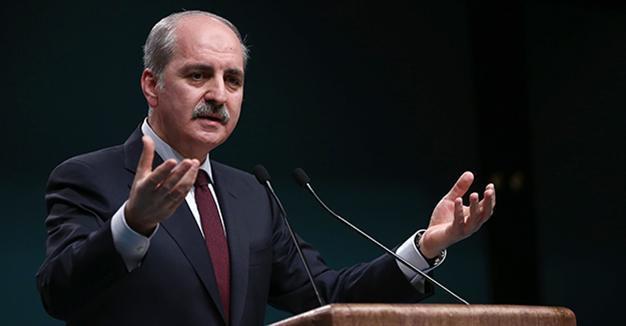Turkey welcomes Syria cease-fire plan, but remains cautious
ANKARA

AA Photo
Turkey has welcomed a Syria cease-fire announced by the United States and Russia, adding that that it was cautious over the implementation of the deal.“I welcome this truce but I am not very optimistic that it will be respected by all the parties,” Turkish Deputy Prime Minister Numan Kurtulmuş was quoted as saying by Agence France-Presse in Ankara on Feb. 23.
He also warned that Turkey could carry on shelling targets of the Syrian Kurdish People’s Protection Units (YPG), the military wing of the Democratic Union Party (PYD), in northern Syria, as it did last week.
A landmark truce is to take effect in Syria on Feb. 27, the United States and Russia announced late Feb. 22, but the “cessation of hostilities” does not include the Islamic State of Iraq and the Levant (ISIL) and the al-Nusra Front, the main jihadist factions.
In a joint statement, Washington and Moscow said the partial truce would begin at midnight Damascus time (2200 GMT Feb. 26), suspending a vicious conflict that has left more than 260,000 people dead and seen half the population displaced.
“If implemented and adhered to, this cessation will not only lead to a decline in violence, but also continue to expand the delivery of urgently needed humanitarian supplies to besieged areas and support a political transition to a government that is responsive to the desires of the Syrian people,” U.S. Secretary of State John Kerry said.
Kurtulmuş said Turkey will continue “if necessary” to hit back at incoming fire from Syria even after the truce comes into force on Feb. 27.
“Turkey will defend its territorial integrity. That is clear,” he added.
Turkey sees the YPG and PYD an offshoot of the outlawed Kurdistan Workers’ Party (PKK), with which it has been in armed clashes since the mid-1980s.
Kurtulmuş said he had “reservations” about the viability of the cease-fire as he feared Russia would simply continue its air bombardments in Syria.
“We hope that no-one will try and carry out air strikes and that no one is going to kill civilians during the cease-fire,” he said. “We hope that all the groups in Syria, including the moderate opposition, will take part in the reconstruction of the country at the end of negotiations.”
Russian President Vladimir Putin said Moscow would do “whatever is necessary” to ensure Damascus respects the agreement.
“We are counting on the United States to do the same with its allies and the groups that it supports,” he said.
The Syrian government and the main umbrella for Syrian opposition and rebel groups announced Feb. 23 their conditional acceptance of the proposed cease-fire that the international community hopes will bring them back to the negotiating table in Geneva for talks to end the war.
The Syrian Foreign Ministry said in a statement Feb. 23 that it accepts the proposed truce, adding that operations will continue against ISIL, the Nusra Front and “other terrorist groups linked to them.”
“The Syrian government stresses the right of its armed forces to retaliate against any violation carried out by these groups,” the ministry’s statement said.
The Syrian announcement came after the main umbrella for Syrian opposition and rebel groups, the High Negotiations Committee, said late Feb. 22 that it “agrees to a temporary truce” as long as the main opposition’s demands are met.
The HNC said the “acceptance of the truce is conditional” to the Syrian government ending its siege of 18 rebel-held areas, releasing detainees and the cessation of aerial and artillery bombardment.
Ahmad Fawzi, a U.N. spokesman, said Feb. 23 that new humanitarian aid deliveries were planned for two suburbs – Moadamiyeh and Kfar Batna – of Syria’s capital, Damascus, in the “coming days.”
Fawzi said U.N. special envoy for Syria Staffan de Mistura would brief the U.N. Security Council “very soon,” and that separate task forces on the cessation of hostilities and humanitarian aid for Syria are to meet this week.
De Mistura halted the latest Syria talks in Geneva on Feb. 3, because of major differences between the two sides, exacerbated by increased aerial bombings and a large-scale government military offensive under the cover of Russian airstrikes.
Meanwhile, Syrian President Bashar al-Assad announced on Feb. 22 that parliamentary elections are to be held on April 13, state news agency SANA reported, shortly after Washington and Moscow announced a ceasefire plan.
Al-Assad issued a decree which included seat allocations for each of the provinces in Syria, which last held parliamentary elections in May 2012.
Hours after the truce was announced, the Syrian Observatory for Human Rights monitoring group said Feb. 23 that the number of dead in Syria’s five-year-long war was estimated at more than 370,000, raising its toll for documented deaths to more than 270,000, according to Reuters.
The observatory said it could not document all deaths for reasons including secrecy over casualties on the part of the warring sides, and difficulties in reaching some areas.
















